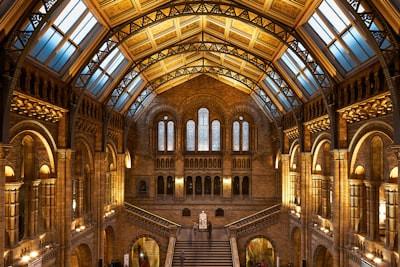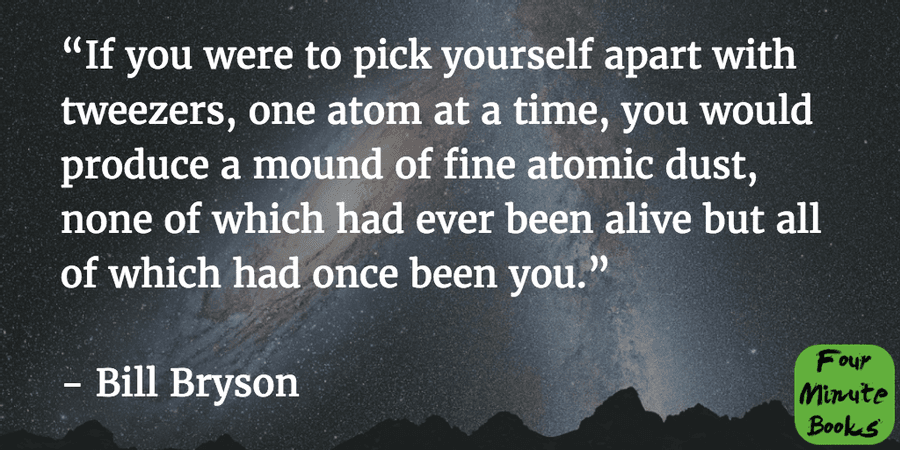A Short History Of Nearly Everything Summary
Curated from: fourminutebooks.com
Ideas, facts & insights covering these topics:
17 ideas
·5.2K reads
40
1
Explore the World's Best Ideas
Join today and uncover 100+ curated journeys from 50+ topics. Unlock access to our mobile app with extensive features.
A Short History Of Everything - Book Summary
A Short History Of Nearly Everything explains everything we’ve learned about our world and the universe so far, including how they formed, how we learned to make sense of time, space and gravity, why it’s such a miracle that we’re alive and how much of our planet is still a complete mystery to us.
29
431 reads
Author Quot
"If you were to pick yourself apart with tweezers, one atom at a time, you would produce a mound of fine atomic dust, none of which had ever been alive but all of which had once been you."
-Bill Bryson
32
523 reads
Book Overview
What’s the most fascinating thing about our world to you? Is it space, other planets, galaxies far far away ? The depth of the ocean and the mysterious, alien-like creatures that live down there? The genetic makeup of all of the species around us?
I’m baffled by all of those things, but I find that even people who don’t show a particular interest in science and history have one or two things they’re absolutely smitten by – and it’s not surprising. There’s so much incredible stuff going on around us, it’s hard to not be starstruck, if you think about it.
27
350 reads
A Short History Of Nearly Everything tries to explain (almost) all of it. At least as much as we know. Bill Bryson has done a tremendous job at it.
26
336 reads
Top 3 Book Lessons
- Most of the universe was created in a single, 3-minute moment.
- Given the odds of a planet being livable, it’s a miracle we’re here at all.
- Every day that the world keeps turning is a gift, because there are many things that could potentially end it.
27
426 reads
Lesson 1: All it took to create most of the universe
A singularity is defined as a moment in which nothing is defined and everything is unpredictable . It’s a massive inflection point. When scientists talk about the “initial” singularity , they refer to the moment the universe was created. It’s hard to imagine, but think of a little, compact point, that is infinitely dense – it contains everything that’s in the universe now, but is compressed into a tiny, tiny dot.
29
374 reads
All of a sudden, it explodes , splattering all of its contents into the void. This moment is known as the big bang . When it happened, the entire universe was created in the time it takes you to prepare a sandwich . Immediately after the blow, the universe doubled in size every 10-34 seconds – that’s FAST. Within three minutes , 98% of all matter in the universe we know today was created.
29
287 reads
With all this expanding, how wide is the universe today? About 100 billion light years – that’s the distance light can travel in a year times 100 BILLION. And light is fast . It travels 300,000 km (or 186,000 miles) per second . That’s this much in a year: 9,460,800,000,000 or about 9.5 trillion.
29
280 reads
Lesson 2: The odds of a planet supporting life are low
If you think about how easy it is to die, it becomes clear how frail human life actually is. I mean, you fall down a couple stairs, hit your head, and that’s it. You dive too deep in the sea, climb too high on a mountain or get stung by the wrong plant or insect, and you’re done.
But an even bigger surprise than us managing to maneuver the dangerous world we live in every day is the fact that we’re here at all .
28
247 reads
It’s pretty rare for a planet to be livable on in general, because several things have to come together:
- The distance to a star must be perfect. If it’s too close, the surface burns, if it’s too far away, the planet will be iced over.
- The planet has to keep out cosmic radiation by building the right atmosphere.
- A moon has to keep the planet’s gravity in check, so that it can spin at the right speed and angle.
- All of these events have to line up in the right order and timeline.
29
240 reads
Lesson 3: There’s a lot that could go wrong for our planet
Let’s reconsider the point above. Humans not falling prey to all the dangers in the world pales in comparison to all the dangers that threaten earth’s existence from the outside.
There are around 1,000,000,000 asteroids flying around space close to the earth, and about 10% of them that regularly intersect with earth’s orbit are larger than 10 meters in diameter. That’s 100 million 10m-sized rocks potentially hitting earth at tremendous speeds!
27
247 reads
In fact, 2,000 of those are so large that upon collision, we might get wiped out completely . According to scientists calculations, those deadly asteroids could fly by and nearly miss around 2-3 times a week – without us even noticing.
As if that wasn’t enough, there are earthquakes, tornados and volcano eruptions, all of which can have devastating consequences.
So no, it’s totally not normal that the sun rises every morning. Every single day is yet another miracle, waiting for you to appreciate it and take advantage of it. Live like it!
29
228 reads
A Short History Of Nearly Everything - Book Review
What a brilliant book to learn a little about all the core pillars that make up our existence and the universe we live in. A Short History Of Nearly Everything should be obligatory reading in all schools!
26
220 reads
Who would I recommend the A Short History Of Nearly Everything?
The 18 year old, who thought science classes in high school were boring, the 29 year old engineer, who knows a lot about his particular field, but could use an update on science in general, and anyone who doesn’t think life is awesome at least once a week.
27
234 reads
IDEAS CURATED BY
CURATOR'S NOTE
A Short History Of Everything - Book Summary
“
Tom Joad's ideas are part of this journey:
Learn more about religionandspirituality with this collection
Understanding the concept of the self
The importance of living in the present moment
The illusion of control
Related collections
Similar ideas
13 ideas
The Universe Has Your Back Summary
fourminutebooks.com
6 ideas
13 ideas
As A Man Thinketh Summary
fourminutebooks.com
Read & Learn
20x Faster
without
deepstash
with
deepstash
with
deepstash
Personalized microlearning
—
100+ Learning Journeys
—
Access to 200,000+ ideas
—
Access to the mobile app
—
Unlimited idea saving
—
—
Unlimited history
—
—
Unlimited listening to ideas
—
—
Downloading & offline access
—
—
Supercharge your mind with one idea per day
Enter your email and spend 1 minute every day to learn something new.
I agree to receive email updates

